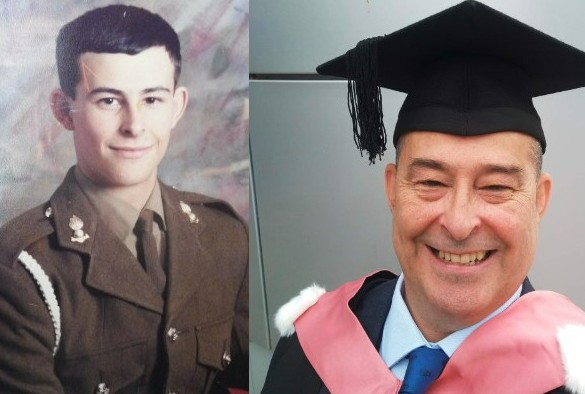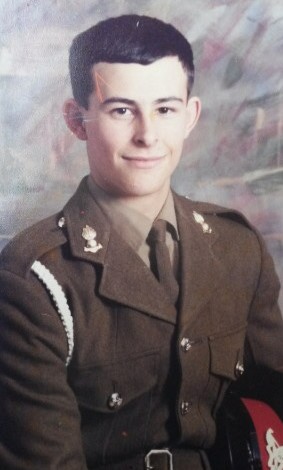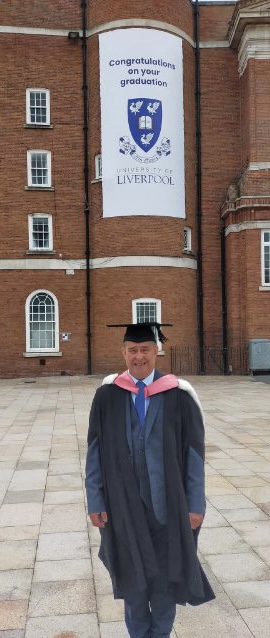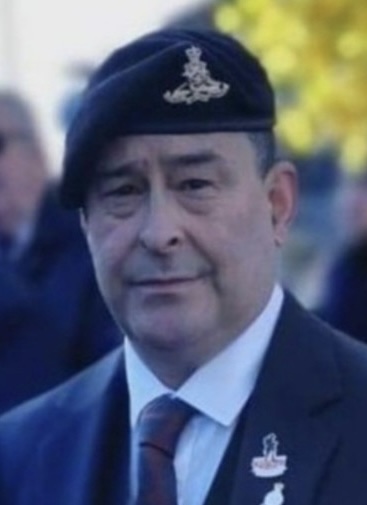
An army veteran is now studying for a PhD in PTSD in Classics and Ancient History after enrolling in the University of Liverpool’s Go Higher access diploma.
Phil Hurworth hopes that his PhD research, examining post-traumatic stress disorder (PTSD) in ancient Greek tragedy plays, will help former military personnel understand and share their experiences of battlefield trauma and PTSD.
57-year-old Phil, from Birkenhead, joined the army when he was just 16, leaving school with no qualifications.
He served in the Royal Artillery for ten years until 1991 when he left the army to raise his family.

Phil didn’t think he would return to education until he came across Go Higher, a University of Liverpool part-time, fast-track humanities programme to help those who haven’t taken the traditional route to university to get back into learning.
Speaking about his experiences, Phil said: “I thought that I could be a P.E. teacher when I left the army because I’d been an army instructor. But when I looked into doing a teaching qualification I was told I couldn’t go any further without GCSE Maths and English and as I didn’t have them. I didn’t think I’d be able to progress and so I’d more or less ruled out returning to education.
“Two really important things changed that – my wife and the Go Higher programme at the University of Liverpool.
“I’ve always been interested in Medieval History and so kept buying lots of books to read. Eventually my wife got sick of seeing all the books and said ‘you need to do something with this, go and study or something!’
“I thought I’d maybe like to go to university, but was worried that this would involve lengthy courses to get GCSEs and A-levels over several years which I didn’t feel I’d be able to complete.
“By chance, when I was looking for access courses online I came across Go Higher at the University of Liverpool. I applied and started the course for one day a week for a year, which fitted really well around my caring responsibilities – my wife’s disabled so I’m her carer and look after my elderly mum too.
“I can’t praise the tutors on Go Higher enough for their encouragement, enthusiasm and support. They encouraged me to read the works of poets like Keats, Byron and other pieces of literature, which inspired me to learn and made me realise that writing and academic work was something I could do.”
After completing his Go Higher course, with the support of his tutors, Phil enrolled in a BA degree in Classics at the University’s Archaeology, Classics and Ancient History department. He excelled in his degree and from there went on to complete his Masters in Classics and Ancient History.

Phil said: “I became more interested in ancient history when I was encouraged to read the Iliad for Go Higher and decided to go down the Classics route for my degree. There were parts of it that were really tough like Greek and Latin grammar- plus translations, none of which I had ever come across before – I think I must have turned my tutors’ hair grey with some of my early efforts!
“But I persevered and the more I learned, the more I got interested in the Greek tragedies. Most of these plays were written by Generals, acted out by soldiers and watched by an audience that was full of soldiers – and that’s where my experience as a veteran came in.
“Within the plays I saw that there were clear examples of the characters having experienced battlefield trauma such as Herakles and Ajax. I did my Masters dissertation on Alexander the Great and his potential for suffering from PTSD which will really annoy scholars who venerate him at every opportunity! This really chimed with my own experiences of PTSD on leaving the army and the trauma my son experienced after serving in Iraq and Afghanistan.
“I realised that if I could research how ancient Greeks experienced and dealt with such trauma, it could help to show other veterans that PTSD is something experienced by soldiers throughout history. I started to study this at undergraduate level, and I want to do some more detailed research for my doctorate.
“I’m only in the first year of my PhD and I’m studying part-time, my research is in its early days and so I don’t want to promise too much yet! But I really hope that my research can help veterans who’ve experienced war and trauma know that they’re not alone, and maybe even encourage veterans to share their experiences like the Greeks did through their plays, or even take up further education.”

Phil credits his progression to PhD study to the support he received from Go Higher. “I only ever set out to get into University but thanks to Go Higher, I’ve achieved more than I ever could have expected – I’ll be graduating my Masters with a distinction this December and will hopefully be able to call myself ‘Doctor’ when I’ve done my PhD in six years!”
“I hope that my story shows that you don’t have to come from a privileged background or even have traditional qualifications to return to learning and excel in the academic world.”
Claire Jones, Director of the University of Liverpool Go Higher Programme said: “As Phil has shown, it doesn’t matter how old you are, how long ago you left school or how many family or caring commitments you have: Go Higher will provide an incredibly supportive environment for you to rapidly progress into Higher Education.
“Our courses attract a range of students – some have very few or no qualifications, some have retired and some are simply wanting to pursue a new career path in the humanities. Whatever your background, do get in touch as we can discuss how our Go Higher course would work for you.”
Go Higher is the University’s part-time humanities access diploma, open to all aged over 20. You don’t need any previous qualifications to apply and the course is run one day a week, over a year, making it the perfect way to balance study with work and family. It is specifically designed to introduce students to the research habits and learning processes required at degree level and to develop the confidence, skills and independence needed for success.
You can find out more here: Go Higher Access Programme Go Higher Access Programme- Faculty of Humanities & Social Sciences – University of Liverpool